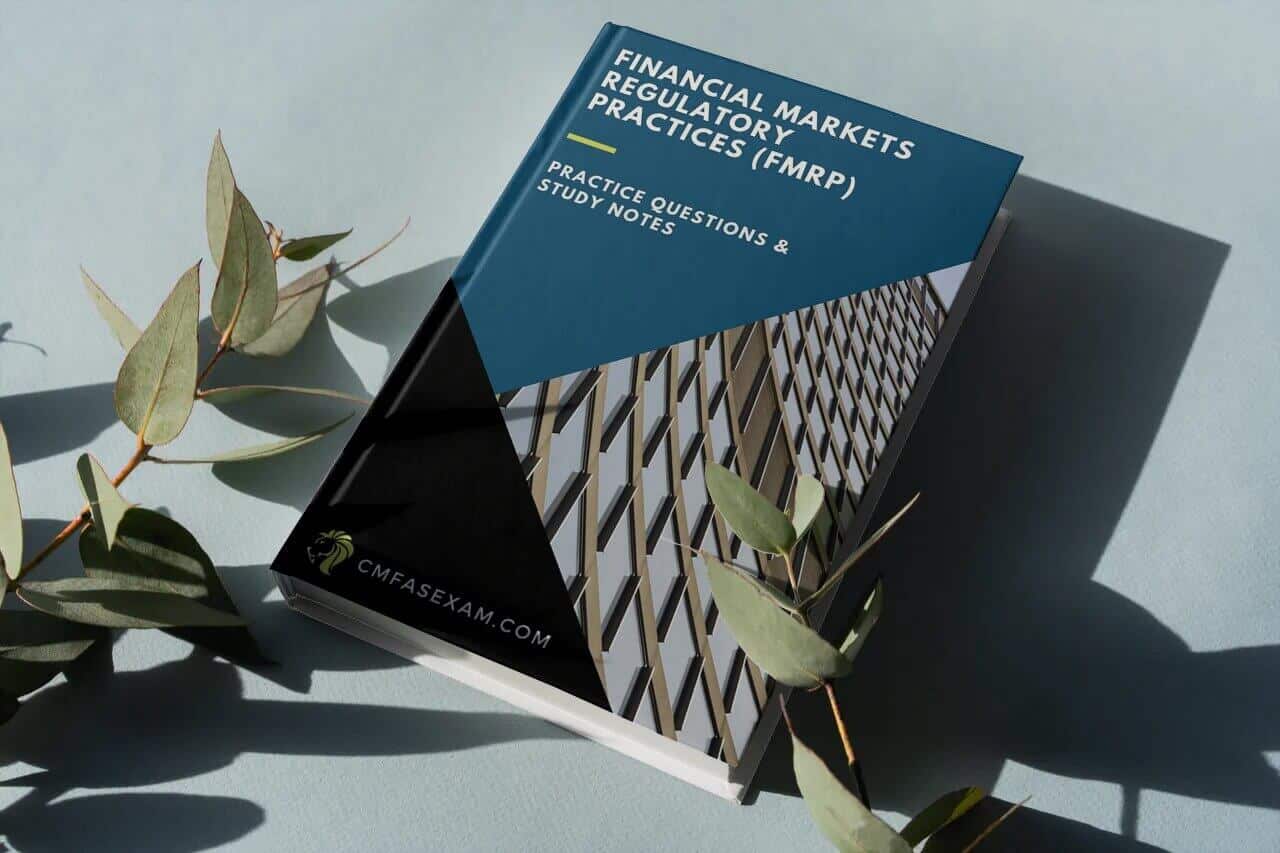CMFAS Financial Markets Regulatory Practices (FMRP) Exam Free Trial Set Two
Let us do all the heavy works so that you can study efficiently.
Quiz-summary
0 of 30 questions completed
Questions:
- 1
- 2
- 3
- 4
- 5
- 6
- 7
- 8
- 9
- 10
- 11
- 12
- 13
- 14
- 15
- 16
- 17
- 18
- 19
- 20
- 21
- 22
- 23
- 24
- 25
- 26
- 27
- 28
- 29
- 30
Information
CMFASExam Practice Questions Free Preview
You have already completed the quiz before. Hence you can not start it again.
Quiz is loading…
You must sign in or sign up to start the quiz.
You have to finish following quiz, to start this quiz:
Results
0 of 30 questions answered correctly
Your time:
Time has elapsed
You have reached 0 of 0 points, (0)
Categories
- Not categorized 0%
-
Congratulations! You have completed CMFASExam set two free trial
Get all premium practice questions, key study notes, and bonus tips today!
>> Learn more about our offer <<
Emma Finch
Customer Success Manager | CMFASexam
- 1
- 2
- 3
- 4
- 5
- 6
- 7
- 8
- 9
- 10
- 11
- 12
- 13
- 14
- 15
- 16
- 17
- 18
- 19
- 20
- 21
- 22
- 23
- 24
- 25
- 26
- 27
- 28
- 29
- 30
- Answered
- Review
-
Question 1 of 30
1. Question
In case of unforeseen events, the disruptions related to Singapore Dollar are dealt by?
Correct
In case of unforeseen events,the disruptions related to Singapore Dollar are dealt by Monetary Authority of Singapore (MAS)
Incorrect
In case of unforeseen events,the disruptions related to Singapore Dollar are dealt by Monetary Authority of Singapore (MAS)
-
Question 2 of 30
2. Question
Which of the following risk does the central counterparty (“CCP”) or clearing house aim to reduce?
Correct
In an effort to reduce pre-settlement risk, central banks around the world have mandated that long-dated FXforward and interest rate swap OTC transactions be cleared on a central counterparty (“CCP”) or clearing house. This would require both counterparties to place margin deposits with the clearing house, proportionate to their exposures, which can be used to cover unrealised losses in event of default by either counterparty.
Incorrect
In an effort to reduce pre-settlement risk, central banks around the world have mandated that long-dated FXforward and interest rate swap OTC transactions be cleared on a central counterparty (“CCP”) or clearing house. This would require both counterparties to place margin deposits with the clearing house, proportionate to their exposures, which can be used to cover unrealised losses in event of default by either counterparty.
-
Question 3 of 30
3. Question
Which circumstance should a Suspicious Transaction Report(STR) be filed?
Correct
For example, a transaction or circumstance could be considered suspicious and warrant filing a STR to the
relevant authorities if the customer:
i. Is unable to complete CDD measures;
ii. Is reluctant, unable or unwilling to provide any information requested by the financial institution; or
iii. Decides to withdraw a pending application to establish business relations or a pending transaction or to
terminate existing business relations.Incorrect
For example, a transaction or circumstance could be considered suspicious and warrant filing a STR to the
relevant authorities if the customer:
i. Is unable to complete CDD measures;
ii. Is reluctant, unable or unwilling to provide any information requested by the financial institution; or
iii. Decides to withdraw a pending application to establish business relations or a pending transaction or to
terminate existing business relations. -
Question 4 of 30
4. Question
Which of the followings are the considerations to mark up on customer’s transactions in order to compensate the market participant?
Correct
Mark up is the spread or charge that may be included in the final price of a transaction in order to compensate the Market Participant for a number of considerations such as the risks taken, costs incurred, and services rendered to a particular customer.
Incorrect
Mark up is the spread or charge that may be included in the final price of a transaction in order to compensate the Market Participant for a number of considerations such as the risks taken, costs incurred, and services rendered to a particular customer.
-
Question 5 of 30
5. Question
How ethics can be defined?
Correct
Ethics can be defined as a framework of moral principles that governs a Individual’s behavior.
Incorrect
Ethics can be defined as a framework of moral principles that governs a Individual’s behavior.
-
Question 6 of 30
6. Question
Which of the following must the licensed financial institutions report to for matters related to actual or suspected misconduct committed by their Representatives?
Correct
Licensed financial institutions that are regulated under the SFA and the FAA must shall report to the MAS, anyactual or suspected misconduct committed by their Representatives, or any of their Representatives who ceased to be a Representative before the misconduct was discovered.
Incorrect
Licensed financial institutions that are regulated under the SFA and the FAA must shall report to the MAS, anyactual or suspected misconduct committed by their Representatives, or any of their Representatives who ceased to be a Representative before the misconduct was discovered.
-
Question 7 of 30
7. Question
Which communication channels are used by SFEMC to disseminate its recommendations or other information to Market Participants during market disruption events?
Correct
The SFEMC will endeavour to disseminate its recommendations or other information to Market Participants through the most efficient means available, including but not limited to announcements through its website, broadcasts through MASNET or direct telephone contacts with or e-mails to senior management of Market Participants.
Incorrect
The SFEMC will endeavour to disseminate its recommendations or other information to Market Participants through the most efficient means available, including but not limited to announcements through its website, broadcasts through MASNET or direct telephone contacts with or e-mails to senior management of Market Participants.
-
Question 8 of 30
8. Question
During market disruption events, Market Participants are also encouraged to establish contacts with which officer of the SFEMC when needed?
Correct
During market disruption events, Market Participants are also encouraged to establish contacts with the Secretary of the SFEMC were needed.
Incorrect
During market disruption events, Market Participants are also encouraged to establish contacts with the Secretary of the SFEMC were needed.
-
Question 9 of 30
9. Question
Which of the following is not a feature of financial markets?
Correct
In order for financial markets to function efficiently and effectively, these key features must be present:
i. Sufficient active Market Participants to ensure liquidity;
ii. The market is reasonably transparent and participants can see prices dealt;
iii. The market has clear and enforceable rules that facilitate orderly trading and prohibit market misconduct;
and
iv. Dealing is performed on a fair and objective “best deal” basis, and is not based on personal relationshipsIncorrect
In order for financial markets to function efficiently and effectively, these key features must be present:
i. Sufficient active Market Participants to ensure liquidity;
ii. The market is reasonably transparent and participants can see prices dealt;
iii. The market has clear and enforceable rules that facilitate orderly trading and prohibit market misconduct;
and
iv. Dealing is performed on a fair and objective “best deal” basis, and is not based on personal relationships -
Question 10 of 30
10. Question
Which market facilitates the exchange of money from one currency to another?
Correct
The FX market facilitates the exchange of money from one currency to another and helps to determine therelative values of different currencies
Incorrect
The FX market facilitates the exchange of money from one currency to another and helps to determine therelative values of different currencies
-
Question 11 of 30
11. Question
Which of the following Ethical principles and standards should not be practiced by a Market Participant
Correct
Ethical principles and standards that Market Participants should strive for include:
i. Honesty in dealing with customers and counterparties;
ii. Fairness in dealing with customers and counterparties;
iii. Consistency of action; and
iv. Integrity, which is best described as doing the right thing, even when no one else is watchingIncorrect
Ethical principles and standards that Market Participants should strive for include:
i. Honesty in dealing with customers and counterparties;
ii. Fairness in dealing with customers and counterparties;
iii. Consistency of action; and
iv. Integrity, which is best described as doing the right thing, even when no one else is watching -
Question 12 of 30
12. Question
What is the financial regulatory authority of Singapore?
Correct
The Monetary Authority of Singapore is Singapore’s central bank and financial regulatory authority. It administers the various statutes pertaining to money, banking, insurance, securities and the financial sector in general, as well as currency issuance.
Incorrect
The Monetary Authority of Singapore is Singapore’s central bank and financial regulatory authority. It administers the various statutes pertaining to money, banking, insurance, securities and the financial sector in general, as well as currency issuance.
-
Question 13 of 30
13. Question
Which of the following is a false trading?
Correct
The false trading offence refers to a false or misleading appearance of active trading or with respect to the market for, or the price for dealings in, securities or futures contract.
Incorrect
The false trading offence refers to a false or misleading appearance of active trading or with respect to the market for, or the price for dealings in, securities or futures contract.
-
Question 14 of 30
14. Question
On which institutions has MAS imposed restrictions regarding the limit of lending of Singapore Dollars(SGD) ?
Correct
Certain Market Participants that are licensed financial institutions, such as banks, merchant banks or CMS Licence holders are subject to restrictions against the lending of SGD. These restrictions imposed by the MAS limit the lending of SGD by such licensed Market Participants to non-resident financial institutions
Incorrect
Certain Market Participants that are licensed financial institutions, such as banks, merchant banks or CMS Licence holders are subject to restrictions against the lending of SGD. These restrictions imposed by the MAS limit the lending of SGD by such licensed Market Participants to non-resident financial institutions
-
Question 15 of 30
15. Question
What is the limit in Singapore Dollars(SGD) that the licensed Market Participants can lend to Non-resident financial institutions?
Correct
A licensed Market Participant may lend SGD to non-resident financial institutions for any purpose whether in Singapore or elsewhere as long as the aggregate SGD credit facilities do not exceed SGD 5 million per borrower
Incorrect
A licensed Market Participant may lend SGD to non-resident financial institutions for any purpose whether in Singapore or elsewhere as long as the aggregate SGD credit facilities do not exceed SGD 5 million per borrower
-
Question 16 of 30
16. Question
Which of the following activities are included in Investment banking ?
Correct
Investment banking activities include: 1)Underwriting 2)Mergers and Acquisitions 3)Sales and Trading Activities 4)Proprietary Trading
Incorrect
Investment banking activities include: 1)Underwriting 2)Mergers and Acquisitions 3)Sales and Trading Activities 4)Proprietary Trading
-
Question 17 of 30
17. Question
Which of the following is not a service of Private Banks?
Correct
Investment banks are also typically required to make markets for the equity and debt securities that they have originated.
Incorrect
Investment banks are also typically required to make markets for the equity and debt securities that they have originated.
-
Question 18 of 30
18. Question
What is known as creating a false impression of depth, or liquidity?
Correct
Creating a false impression of depth, or liquidity is referred to as quote stuffing or “wash trades.Creating an artificial impression of high demand for the asset is known as spoofing while creating a false impression of depth or liquidity is known as quote stuffing.
Incorrect
Creating a false impression of depth, or liquidity is referred to as quote stuffing or “wash trades.Creating an artificial impression of high demand for the asset is known as spoofing while creating a false impression of depth or liquidity is known as quote stuffing.
-
Question 19 of 30
19. Question
Hunting for Stops & Wash Trades are 2 common practices of ?
Correct
The most common false trading practices are Hunting for Stops & Wash Trades .
Incorrect
The most common false trading practices are Hunting for Stops & Wash Trades .
-
Question 20 of 30
20. Question
Which of the following statement is not true in regard of after hours and off premises dealings by the market participants?
Correct
After Hours and Off Premises Dealing – If Market Participants allow after hours and off premises dealing, there should be:
a. Guidelines that specify personnel authorized to engage in such activity;
b. Possible reduction of the position and loss limits allowed, reflecting the reduced decision-making resources available outside the dealing room;
c. Possible restrictions on type of transactions allowed, such as only allowing risk-reducing transactions;
d. Other risk mitigating measures, such as the mandatory inclusion of stop-loss orders;
e. A prompt written reporting process should be developed, and appropriate records should be kept for any after hours and off premises transactions undertaken.Incorrect
After Hours and Off Premises Dealing – If Market Participants allow after hours and off premises dealing, there should be:
a. Guidelines that specify personnel authorized to engage in such activity;
b. Possible reduction of the position and loss limits allowed, reflecting the reduced decision-making resources available outside the dealing room;
c. Possible restrictions on type of transactions allowed, such as only allowing risk-reducing transactions;
d. Other risk mitigating measures, such as the mandatory inclusion of stop-loss orders;
e. A prompt written reporting process should be developed, and appropriate records should be kept for any after hours and off premises transactions undertaken. -
Question 21 of 30
21. Question
Which of the following is not an element of Business Continuity Plans (BCPs)
Correct
BCPs should be updated regularly in response to environmental changes.
Incorrect
BCPs should be updated regularly in response to environmental changes.
-
Question 22 of 30
22. Question
Which of the following is true about stop orders?
Correct
Please note that parties giving or receiving stop orders should ensure that both parties mutually understand the terms under which such orders are made. For example, Market Participants handling a customer’s stop order should:
I. Obtain from the customer the information required to fully define the terms of a stop order, such as the reference price, order amount, time period, and triggerIncorrect
Please note that parties giving or receiving stop orders should ensure that both parties mutually understand the terms under which such orders are made. For example, Market Participants handling a customer’s stop order should:
I. Obtain from the customer the information required to fully define the terms of a stop order, such as the reference price, order amount, time period, and trigger -
Question 23 of 30
23. Question
Where a Market Participant engages in borrowing or lending of securities to a customer, a written agreement should be put in place, setting out the terms and conditions of the borrowing or lending. Which of the following options should be included in the agreement?
Correct
When a Market Participant engages in borrowing or lending of securities to a customer, there should be some terms and conditions set in a written agreement. Among them, stating the capacities in which the parties are entering into the agreement whether as principal or agent should be included too.
Incorrect
When a Market Participant engages in borrowing or lending of securities to a customer, there should be some terms and conditions set in a written agreement. Among them, stating the capacities in which the parties are entering into the agreement whether as principal or agent should be included too.
-
Question 24 of 30
24. Question
Which of the following option related to additional specific execution requirements for IDBs who handle customer orders is correct?
Correct
They are some additional specific execution requirements for IDBs who handle customer. Among them is when Market Participants place orders with special conditions attached, IDBs must accurately relay the said conditions
Incorrect
They are some additional specific execution requirements for IDBs who handle customer. Among them is when Market Participants place orders with special conditions attached, IDBs must accurately relay the said conditions
-
Question 25 of 30
25. Question
Which of the following statements are the purposes of generating trade confirmations?
I. The practice of deal confirmation helps to detect discrepancies immediately after the transaction
II. To reduce the operational risk
III. To indicate any kind of false economic details
IV. To give all the details of the trade to the counter partiesCorrect
It is to be noted that the purposes of generating trade confirmations are as follow
I. The practice of deal confirmation helps to detect discrepancies immediately after the transaction
II. To reduce the operational risk
III. To indicate any kind of false economic details
IV. To give all the details of the trade to the counter partiesIncorrect
It is to be noted that the purposes of generating trade confirmations are as follow
I. The practice of deal confirmation helps to detect discrepancies immediately after the transaction
II. To reduce the operational risk
III. To indicate any kind of false economic details
IV. To give all the details of the trade to the counter parties -
Question 26 of 30
26. Question
Which of the following are the guidance provided by IOSCO Principles?
I: Governance
II: Benchmark Quality
III: Integration
IV: AccountabilityCorrect
IOSCO Principles provide guidance on: i. Governance: Addressing Conflicts of Interest and protecting the integrity of the Benchmark determination process; ii. Benchmark quality: Improving the integrity and quality of Benchmark determination; iii. Methodology: Improving the integrity and quality of adopted Methodologies; iv. Accountability: Establishing complaints processes, documentation requirements and audit reviews.
Incorrect
IOSCO Principles provide guidance on: i. Governance: Addressing Conflicts of Interest and protecting the integrity of the Benchmark determination process; ii. Benchmark quality: Improving the integrity and quality of Benchmark determination; iii. Methodology: Improving the integrity and quality of adopted Methodologies; iv. Accountability: Establishing complaints processes, documentation requirements and audit reviews.
-
Question 27 of 30
27. Question
18. The code of conduct for the submitters does not include which of the following points
Correct
It is noticeable that the code of conduct for submitters include, integrity, professionalism, ethical standards, providing commentaries on benchmarks, benchmarks that are not overseen by the benchmark administrator and prohibited behavior only.
Incorrect
It is noticeable that the code of conduct for submitters include, integrity, professionalism, ethical standards, providing commentaries on benchmarks, benchmarks that are not overseen by the benchmark administrator and prohibited behavior only.
-
Question 28 of 30
28. Question
What are FX and interest rate benchmarks used for
Correct
Please note that these benchmarks (FX and Interest Rate) are used for the settlement of contracts, such as NDFs and loans, such as floating rate loans.
Incorrect
Please note that these benchmarks (FX and Interest Rate) are used for the settlement of contracts, such as NDFs and loans, such as floating rate loans.
-
Question 29 of 30
29. Question
Which of the following are the stages involved in the process of money laundering?
Correct
The three main steps of money laundering is
Placement Stage
Layering Stage
Integration StageIncorrect
The three main steps of money laundering is
Placement Stage
Layering Stage
Integration Stage -
Question 30 of 30
30. Question
Which of the following is false about operational risk?
Correct
Market Participants should have appropriate processes in place to identify and manage operational risks. The causes of such risk could be internal issues, such as human error or misconduct, inadequate systems or processes, system failures, sabotage or gaps in processes. The risk cannot occur when there is continuity in the process.
Market Participants should also consider operational risks which arise from factors beyond their organisation’s control. Such external events include civil disturbances and natural disasters, time differences and differing industry conventions across countries and terrorism.Incorrect
Market Participants should have appropriate processes in place to identify and manage operational risks. The causes of such risk could be internal issues, such as human error or misconduct, inadequate systems or processes, system failures, sabotage or gaps in processes. The risk cannot occur when there is continuity in the process.
Market Participants should also consider operational risks which arise from factors beyond their organisation’s control. Such external events include civil disturbances and natural disasters, time differences and differing industry conventions across countries and terrorism.
Why CMFASExam
Enormous Exam Bank
Large number of questions to help you memorize all possible exam content
Explanation Provided
Get detailed explanation right after each questions
Support All Devices
Support all tablets and handheld. Study anywhere
Until You Pass Guarantee
We are very confident with our product. Therefore all purchase comes with a success guarantee
Bonus Tips
Get the bonus article of: 17 Secret Tips To Improve CMFAS Study by 39%
Adhere to CMFAS Examination Format
All questions are adhered to the real examination format to simulate the real exam environment
Frequently Updated
Our exam bank is frequently updated by our examination team
Carefully Crafted
Each questions is carefully crafted by our exam specialist and adhere to the real question formats
Instant Access
No delivery time and fee is needed. Access immediately after payment

 Congratulations! You have completed CMFASExam set two free trial
Congratulations! You have completed CMFASExam set two free trial

